If you are looking for some fresh and exciting movies to watch, why not explore the world of foreign cinema? Foreign movies can be a great way to discover rich and diverse range of new stories, genres, and filmmakers that you may not be familiar with. They can also broaden your horizons and expose you to different cultures, languages, and realities. But where do you start? From an overwhelming number of options, below is a list to begin with.
Bicycle Thieves
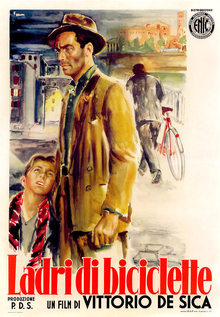
Bicycle Thieves. 1948. Wikipedia. wikipedia.org. 13 February 2024.
https://go.iu.edu/4VxQ
“The Bicycle Thieves,” directed by Vittorio De Sica, is a poignant masterpiece of Italian neorealism. Set in post-World War II Rome, the film follows the story of Antonio Ricci, a struggling father who finally lands a job hanging posters around the city. However, his newfound employment requires a bicycle, which is promptly stolen on his first day of work. With his livelihood hanging in the balance, Antonio and his young son embark on a desperate quest through the streets of Rome to retrieve the stolen bicycle.
De Sica’s direction, coupled with stunning cinematography and a minimalist yet deeply affecting screenplay, elevates the film into a timeless classic that continues to resonate with audiences worldwide. “The Bicycle Thieves” is a masterpiece of storytelling that reminds us of the inherent dignity and resilience of the human spirit, even in the face of overwhelming adversity.
Rashomon
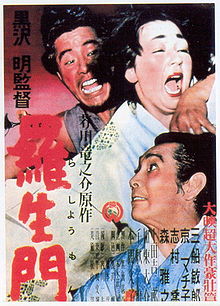
Rashomon. 1950. Wikipedia. wikipedia.org. 13 February 2024.
https://go.iu.edu/4VyS
“Rashomon,” directed by the legendary Japanese filmmaker Akira Kurosawa, is a groundbreaking masterpiece that explores the elusive nature of truth and the subjectivity of human perception. Set in feudal Japan, the film revolves around a brutal crime – the rape of a woman and the murder of her husband – which is recounted from multiple perspectives by four different characters: a bandit, the woman, the murdered man (through a medium), and a woodcutter who witnessed the events.
As each character recounts their version of the events, conflicting accounts and contradictory truths emerge, leaving the audience to ponder the elusive nature of objective reality. Kurosawa skillfully uses narrative ambiguity and visual storytelling to create a deeply engrossing and thought-provoking cinematic experience.
At its core, “Rashomon” is a profound meditation on the nature of truth, justice, and the complexities of the human condition. It challenges viewers to confront their own preconceptions and biases, ultimately leaving them with more questions than answers. “Rashomon” is not only a cinematic masterpiece but also a perpetual exploration of the fundamental mysteries of human existence.
Cinema Paradiso
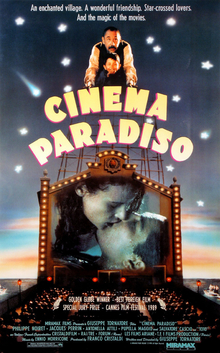
Cinema Paradiso. 1988. Wikipedia. wikipedia.org. 13 February 2024.
https://go.iu.edu/4VyW
“Cinema Paradiso,” directed by Giuseppe Tornatore, is a nostalgic ode to the magic of cinema and the power of friendship. Set in a small Sicilian village, the film follows the life of Salvatore “Toto” Di Vita, who grows up enamored with the local movie theater, Cinema Paradiso, and its charismatic projectionist, Alfredo. Through Toto’s eyes, we witness the transformative effect of cinema on the community and his own coming-of-age journey. The film beautifully captures the essence of childhood innocence, first love, and the bittersweet passage of time.
At its heart, “Cinema Paradiso” is a love letter to the transformative power of storytelling and the enduring impact of cherished memories. It’s a timeless masterpiece that reminds us of the profound influence that art, friendship, and the magic of the movies can have on our lives.
The 400 Blows
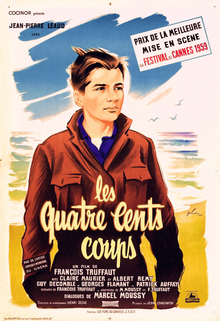
The 400 Blows. 1959. Wikipedia. wikipedia.org. 13 February 2024.
https://go.iu.edu/4VyY
“The 400 Blows,” directed by François Truffaut, is a seminal work of the French New Wave that follows the poignant journey of a young boy named Antoine Doinel as he navigates the trials and tribulations of adolescence in post-war Paris. Set against the backdrop of a gritty and often indifferent urban landscape, the film offers a raw and unflinching portrayal of Antoine’s troubled upbringing. Truffaut’s direction captures the essence of youth with a remarkable blend of empathy and honesty, inviting viewers to empathize with Antoine’s struggles as he grapples with a dysfunctional family, academic challenges, and the longing for genuine connection and understanding.
Central to the film is a deeply humanistic exploration of identity, alienation, and the quest for freedom. Through Antoine’s eyes, we witness the universal experience of adolescence – the search for meaning, the yearning for autonomy, and the pain of disillusionment. Visually arresting and thematically rich, “The 400 Blows” showcases an intimate portrayal of youth and its enduring relevance as a poignant reflection on the human condition.
Stalker
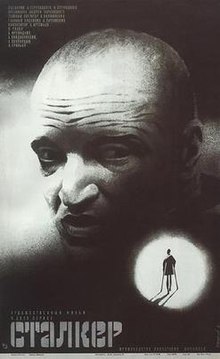
Stalker. 1979. Wikipedia. wikipedia.org. 13 February 2024.
https://go.iu.edu/4Vz0
“Stalker,” directed by Andrei Tarkovsky, stands as a captivating and mysterious opus within Soviet cinema, delving deep into the realms of philosophy, spirituality, and existentialism. Set in a post-apocalyptic world, the film follows a mysterious guide known as a “Stalker” as he leads two clients, the Writer and the Professor, through the hazardous and surreal landscape of “The Zone” in search of a mythical place called the “Room,” which is said to fulfill one’s innermost desires.
“Stalker” is a deeply philosophical exploration of the human condition, grappling with themes of belief, perception, and the nature of reality. Tarkovsky’s contemplative direction and deliberate pacing immerse viewers in a hauntingly atmospheric world, where every frame is imbued with symbolic significance and profound introspection.
Visually stunning and intellectually stimulating, the film invites audiences to ponder the mysteries of existence and the elusive pursuit of truth and meaning. “Stalker” is a cinematic experience unlike any other, challenging conventional storytelling conventions and inviting viewers on a transcendent journey of self-discovery and enlightenment.
Persona
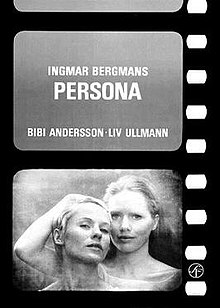
Persona. 1966. Wikipedia. wikipedia.org. 13 February 2024.
https://go.iu.edu/4Vz2
“Persona,” by Swedish director Ingmar Bergman, presents a captivating and introspective journey into the depths of identity, consciousness, and the intricate dynamics of human connections. The narrative orbits around Alma, a nurse, and Elisabet Vogler, an actress who has fallen into a silence. As Alma tends to Elisabet in a secluded beach house, the lines between their individual identities begin to blur, initiating a deep and unsettling exploration of their innermost selves. Through a series of fragmented narratives and surreal imagery, the film explores themes of identity, alienation, and the porous boundaries between reality and illusion.
Bergman’s masterful direction and stark cinematography create an atmosphere of eerie intimacy, drawing audiences into the psychological labyrinth of the two central characters. “Persona” is not merely a narrative film; it is a deeply experiential work of art that invites viewers to engage with its enigmatic symbolism and provocative themes on a visceral level. With its haunting beauty and profound philosophical depth, “Persona” stands as a landmark achievement in cinema, pushing the boundaries of storytelling and challenging viewers to confront the mysteries of the human psyche.
Tokyo Story

Tokyo Story. 1953. Wikipedia. wikipedia.org. 13 February 2024.
https://go.iu.edu/4Vz3
“Tokyo Story,” directed by Yasujirō Ozu, is a poignant and understated masterpiece of Japanese cinema that explores the complexities of family, aging, and societal change. The film follows an elderly couple, Shukichi and Tomi Hirayama, as they travel from their rural hometown to Tokyo to visit their grown children. However, their visit reveals the growing disconnect between generations and the fragility of familial bonds in a rapidly modernizing society.
“Tokyo Story” showcases engaging humanistic portrayal of the universal experience of aging and the tensions that arise between parents and children. The film’s universal theme resonates continually and have earned it a reputation as one of the greatest films ever made. With a gentle pacing and understated performances, it invites viewers to reflect on their own relationships and the passage of time.
Laxmikant Kabra is a Graduate student at Indiana University. He is an admirer of all movie genres and enjoys for all forms of media while having an enthusiasm for tech.
Leave a Reply